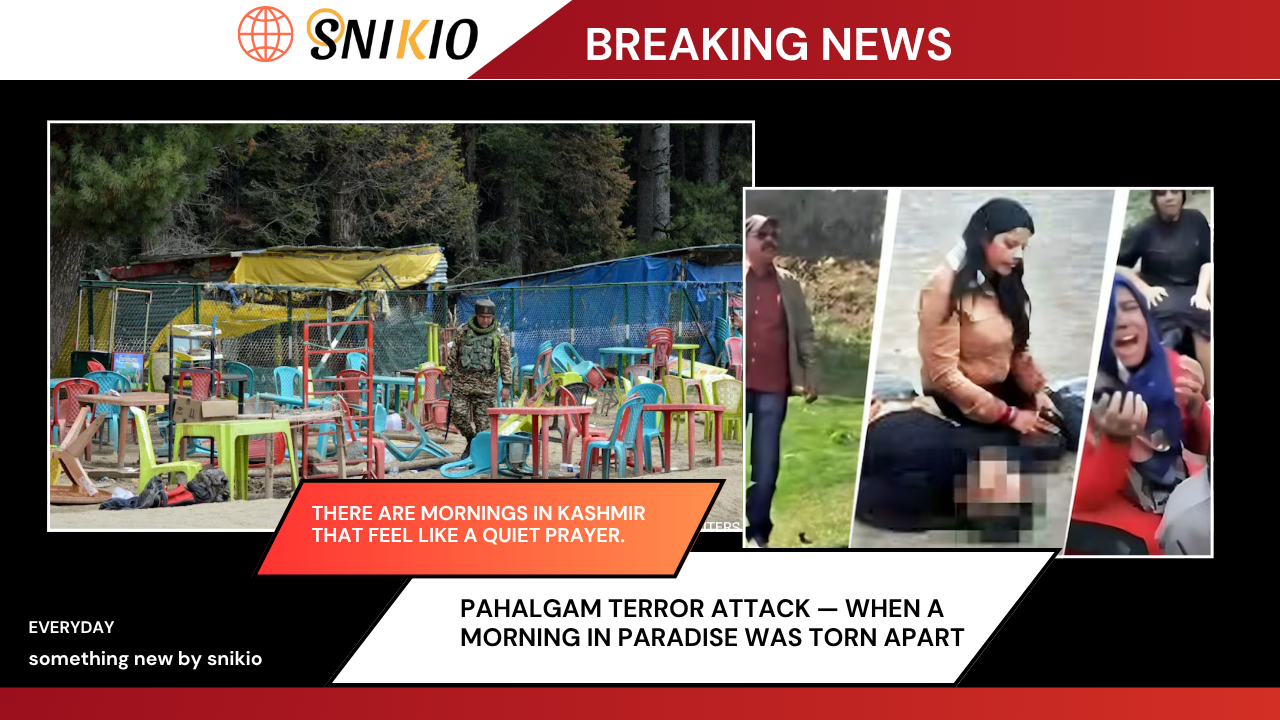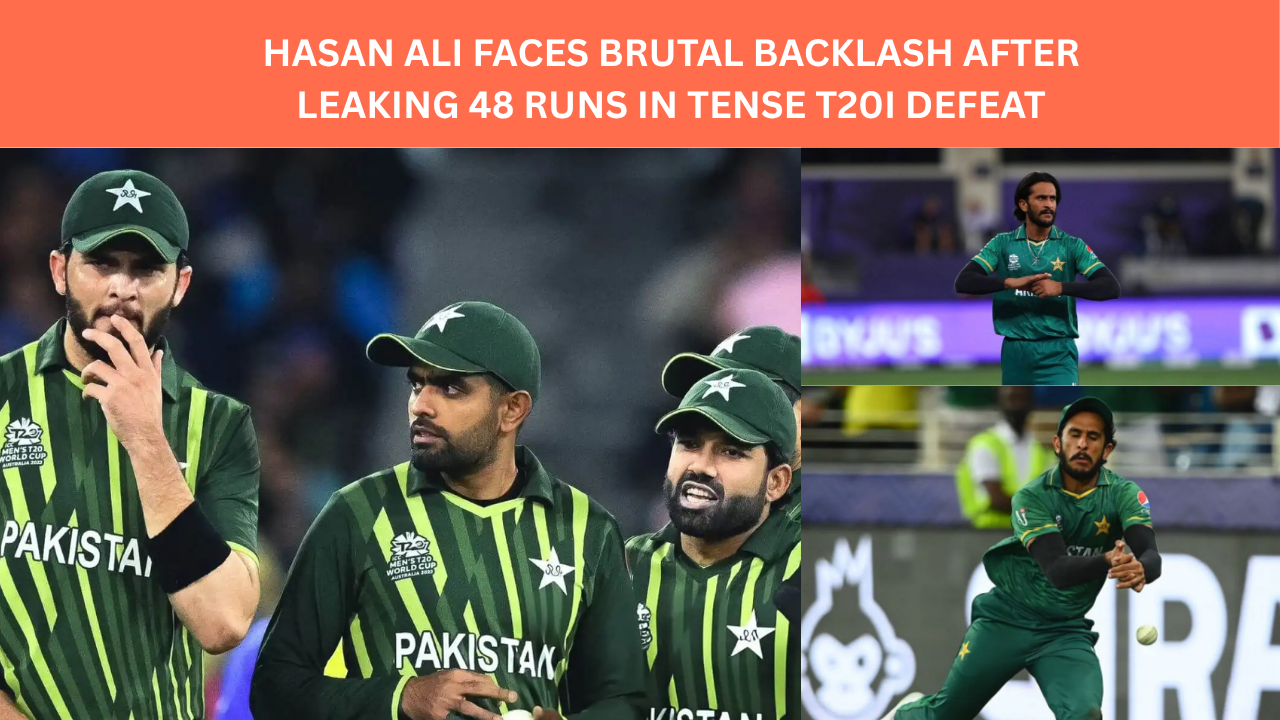
Pahalgam Terror Attack — When a Morning in Paradise Was Torn Apart
By Snikio
There are mornings in Kashmir that feel like a quiet prayer.
Pahalgam in April is one of them — the kind of place where the air smells faintly of pine and clings to you, lingering in your scarf or sleeves. The mountains still hold on to patches of melting snow, like old white shawls slipping from their shoulders, their edges unravelling into thin, restless streams that make their way to the Lidder. Down in the bazaar, shop shutters creak their way up, as if even they don’t want to break the calm. From somewhere behind a half-shut door comes the soft hiss of a kettle — not loud, but just enough to say, the day’s waking up.
That Monday started like any other.
A horse stood by the roadside, shifting now and then, little puffs of breath in the cold air that disappeared as soon as they formed. A boy — ten, maybe twelve — beat the dust off a wooden bench outside his father’s shop. Thump. Pause. Thump. An ordinary scene you barely notice — until it isn’t there anymore.
And then — it was gone.
A sound tore through the valley. Not one, but a burst. Bullets.
The kind of sound that strips every other sound out of the air. No warning. No voices first. Just metal ripping into the quiet.
Tea cups crashed to the ground. Tourists scattered — some running, some tripping, some frozen mid-step as though rooted to the spot. In less than a minute, two people lay dead. Eight more were hurt. A moment earlier the dust was bright in the sun; now it sat heavy, carrying a hard mix — the sharp bite of gunpowder and the metallic smell of blood.
The market’s low buzz stopped.
Ambulance sirens took over, bouncing off the hills — each one landing harder than the last.
Who Did This, and Why
Early reports point to Jaish-e-Mohammed — the Pakistan-based group that has been on India’s radar for years.
- Date & Time: 21 April 2025, a little after 10:30 a.m. — that slow part of the morning when shopkeepers are still setting up their stalls and the streets haven’t fully stretched awake.
- Location: Less than a kilometre from a security checkpoint, on a stretch of road where no one expected trouble.
- Method: The gunmen moved like they belonged there, then, without warning, fired from close range before vanishing into Pahalgam’s narrow lanes.
- Likely Motive: To cut into the tourist season, to spread fear before the G20, and to send a message they wanted heard far beyond the valley.
The Prime Minister Speaks
Three days later, Prime Minister Narendra Modi addressed the nation — his voice firm, the pauses deliberate:
“This is not only an attack on Jammu and Kashmir — it is an assault on the very soul of India. The conspirators will face consequences far harsher than they can imagine.”
It was more than a speech. It was a warning wrapped in three points:
- No Safe Haven: Every terrorist will be hunted down.
- One Nation: The attack wasn’t on Kashmiris alone — it was on every Indian.
- To Pakistan: “If Pakistan understands, good; if not…” — the silence that followed was its own sentence.
A Strike Meant to Hurt Deep
“This wasn’t random,” said Ashok Kumar, a former RAW officer. “It was calculated, deliberate — and timed to shake the season.”
Security analyst Dr. Priya Sharma put it plainly:
“Spring is when Kashmir breathes easy. Hotels full, shikaras booked, the local economy alive. This was aimed at cutting that lifeline with fear.”
The Response
Within 24 hours, J&K Police tracked down and killed three militants linked to the shooting. Raids hit multiple suspected hideouts in South Kashmir. The Army’s presence tightened. Intelligence networks went into overdrive.
In Delhi, officials won’t say it out loud, but cross-border options are being weighed.
Why Pahalgam Feels Different
You don’t need to have been to Pahalgam to feel this one.
It’s the start point of the Amarnath Yatra. It’s been the backdrop for Bollywood love stories. It’s a place where a meadow, a riverbank, and a cup of kahwa can make you forget the rest of the world.
To fire bullets here isn’t just violence. It’s vandalism against memory.
Yet another survival story from the tainted Baisaran valley in Pahalgam. We survived the horror to tell the story of what can only be described as monstrous act and paint the heavenly beauty blood-red with hellfire.
— Prasanna Kumar Bhat (@prasannabhat38) April 25, 2025
By the grace of the God, luck, and some quick thinking from… pic.twitter.com/00ln2y0DJo
The Road Ahead
India’s challenge now is not only to answer with force, but to stop the next bullet before it’s fired — through sharper intelligence, deeper local trust, and breaking militant networks piece by piece.
From big city offices to roadside tea stalls, the mood is the same: grief, anger, and a stubborn resolve.
Hashtags like #IndiaFightsTerror aren’t just Twitter noise — they’re what people are saying out loud in buses, in markets, in living rooms.
The Detail That Lingers
The attackers didn’t survive the day. Justice? Maybe the start of it. Closure? Not yet.
Reader Questions
Has Pahalgam seen this before?
Yes, but rarely so blatantly targeting unarmed civilians.
Will tourism bounce back?
In time, yes. Kashmir has a way of pulling people back.
Was Pakistan involved?
Investigators say the trail leads to Pakistan-based groups. How direct the hand was — still under probe.






